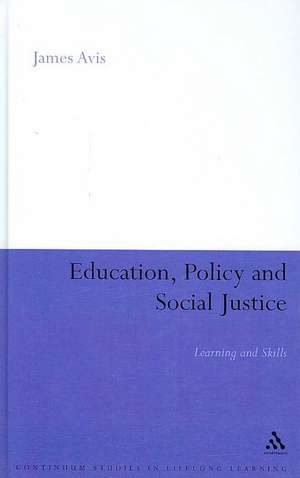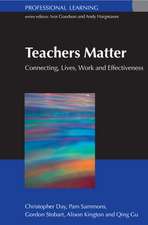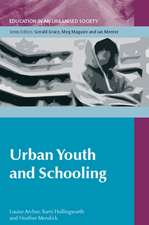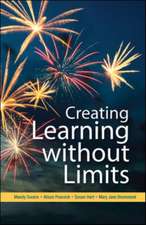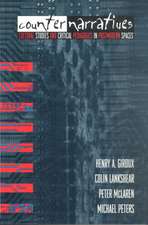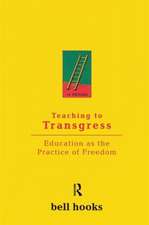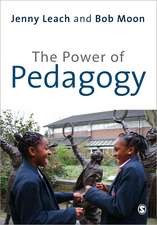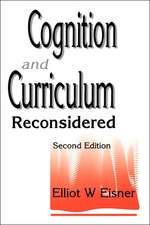Education, Policy and Social Justice: Learning and Skills: Continuum Studies in Lifelong Learning
Autor James Avisen Limba Engleză Hardback – 4 apr 2007
| Toate formatele și edițiile | Preț | Express |
|---|---|---|
| Paperback (1) | 304.55 lei 6-8 săpt. | |
| Bloomsbury Publishing – 21 iun 2009 | 304.55 lei 6-8 săpt. | |
| Hardback (1) | 888.26 lei 6-8 săpt. | |
| Bloomsbury Publishing – 4 apr 2007 | 888.26 lei 6-8 săpt. |
Preț: 888.26 lei
Preț vechi: 1139.76 lei
-22% Nou
Puncte Express: 1332
Preț estimativ în valută:
169.96€ • 177.47$ • 140.35£
169.96€ • 177.47$ • 140.35£
Carte tipărită la comandă
Livrare economică 15-29 aprilie
Preluare comenzi: 021 569.72.76
Specificații
ISBN-13: 9780826486936
ISBN-10: 0826486932
Pagini: 216
Dimensiuni: 156 x 234 x 21 mm
Greutate: 0.39 kg
Ediția:1
Editura: Bloomsbury Publishing
Colecția Continuum
Seria Continuum Studies in Lifelong Learning
Locul publicării:London, United Kingdom
ISBN-10: 0826486932
Pagini: 216
Dimensiuni: 156 x 234 x 21 mm
Greutate: 0.39 kg
Ediția:1
Editura: Bloomsbury Publishing
Colecția Continuum
Seria Continuum Studies in Lifelong Learning
Locul publicării:London, United Kingdom
Caracteristici
James Avis incorporates emprical and theoretical evidence to deliver a convincing and controversial argument that modern education policy allows and even gives opportunities for dissent.
Cuprins
Acknowledgements \ 1. Introduction \ 2. Fordism, Post-Fordism and Beyond \ 3. Work-based Learning and Social Justice: 'Learning to Labour' and the New Vocationalism \ 4.
Learner Dispositions: Continuity and Change \ 5. Teachers and the Transformation of Practice \ 6. Knowledge, Curriculum and Power \ 7. Social Justice, Post-compusory Education and Practice \ 8. Conclusion \ References \ Index
Recenzii
"Avis' vigorous mapping out of the contradictions between the social justice claims of Post-compulsory Education and Training (PCET) and its ambivalent relationship to the oppressive structures of value creation is an excellent resource to academics, postgraduate students and PCET practitioners." Dr Paul Warmington University of Birmingham, UK
'Stimulating and readable... a detailed and insightful commentary on education policy and research over several decades, this book makes its own distinct analytical contribution to this project, and as such deserves to be read by all interested in the purpose and nature of education within wider society.' Professor Jeremy Higham University of Leeds, UK
"What makes this book especially attractive is its appeal to those who might not necessarily consider themselves educators of adults or those who can form the next generation of adult educators. There is a constant need to re-introduce such ideas in a language and a context that is meaningful to them. So, Avis' work could serve as an excellent foundational textbook for any postgraduate course on work and learning, adult education and social justice, or the policies of lifelong learning." Tom Nesbit, Simon Fraser University Studies in the Education of Adults Vol. 41, No. 1, Spring 2009
"A very valuable resource not only for teachers, teacher educators, managers, policy makers and researchers in the learning and skills sector, but also for those working in the 14-19 schools sector. ... This relatively small volume marshals a breathtaking sweep of ideas in considerable depth yet, at the same time, with great succinctness. ... A sharp and authoritative critique of policy, practice and research in the PCET sector and thereby makes a very important contribution to thinking in this field."Higher Education Review
'Stimulating and readable... a detailed and insightful commentary on education policy and research over several decades, this book makes its own distinct analytical contribution to this project, and as such deserves to be read by all interested in the purpose and nature of education within wider society.' Professor Jeremy Higham University of Leeds, UK
"What makes this book especially attractive is its appeal to those who might not necessarily consider themselves educators of adults or those who can form the next generation of adult educators. There is a constant need to re-introduce such ideas in a language and a context that is meaningful to them. So, Avis' work could serve as an excellent foundational textbook for any postgraduate course on work and learning, adult education and social justice, or the policies of lifelong learning." Tom Nesbit, Simon Fraser University Studies in the Education of Adults Vol. 41, No. 1, Spring 2009
"A very valuable resource not only for teachers, teacher educators, managers, policy makers and researchers in the learning and skills sector, but also for those working in the 14-19 schools sector. ... This relatively small volume marshals a breathtaking sweep of ideas in considerable depth yet, at the same time, with great succinctness. ... A sharp and authoritative critique of policy, practice and research in the PCET sector and thereby makes a very important contribution to thinking in this field."Higher Education Review
